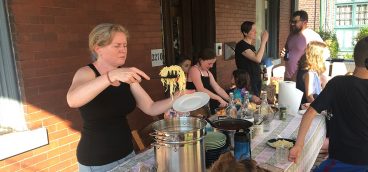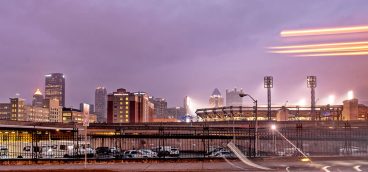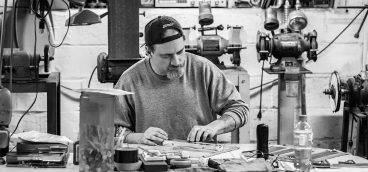
Since the Buhl Foundation began in 1927, Pittsburgh’s philanthropic landscape has changed dramatically, with the creation of the Richard King Mellon Foundation, Heinz Endowments, Hillman Foundation, The Pittsburgh Foundation, Grable Foundation, Colcom Foundation, Benedum Foundation and McCune Foundation, among many others. This rich collection of foundation partners has embroidered the fabric of Pittsburgh— from human services to education to arts and culture—with opportunities unseen in any other U.S. region.
This philanthropic strength also has provided an opportunity for the Buhl Foundation to re-envision its giving and to focus for the foreseeable future on its historic home—Pittsburgh’s North Side.
“Historically, although Buhl has always had a particular interest in Pittsburgh and the North Side, our giving tradition is broad in nature,” said Buhl Foundation President Fred Thiemann. “Yet perhaps more so now than ever, the foundation sees the North Side as standing on the brink of something great: an opportunity to be Pittsburgh’s most successful, diverse and inclusive neighborhood; a perfect place to live, work and play; to raise a family; to broaden one’s cultural horizons; to view major league sports or to stroll into the heart of downtown Pittsburgh.”
Yet, at the same time, the North Side remains an enigma. Its rich cultural amenities are the envy of any place in the region. But it’s also a patchwork of separate neighborhoods that are often isolated and competitive, with many residents unable to share in the amazing resurgence that Pittsburgh has enjoyed as a post-industrial city.
Henry Buhl Jr. built his fortune in the retail industry and created the Buhl Foundation—Pittsburgh’s first multi-purpose foundation—as a memorial to his beloved wife, Louise C. Buhl. He directed the foundation to be especially concerned with the “well-being of the citizens of the City of Pittsburgh, and the County of Allegheny.” To that end, the foundation’s mission is: to create community legacies by leveraging its resources to encourage people and organizations to dream, to innovate and to take action. And over the years, the organization has helped establish a number of organizations that are now Pittsburgh institutions, including Blue Cross/Blue Shield of Western Pennsylvania, the University of Pittsburgh’s School of Social Work, the Pittsburgh Foundation, the University of Pittsburgh Press, Western Pennsylvania Conservancy and the Economy League of Pennsylvania.
The Buhl Foundation has historically been particularly sensitive to four major areas: education, youth development, human services, and economic and community development. In its revisioning effort, the foundation aims to integrate these themes into a more geographically focused strategy on Pittsburgh’s North Side. To that end, for the past two years, the foundation has been working with the North Side community on an exciting project. The journey began with two core values—to build from the assets that exist there, and to support the ability of residents to create their own solutions.
We began by asking residents if they wanted the Buhl Foundation to pursue a strategy focused on the North Side. The foundation convened a representative cross section of 500-plus residents for conversations, focus groups and interviews, and their answer was a resounding “yes.” It was immediately clear that the “secret sauce” in this project would be the North Side’s diverse residents—a group of 40,000 people who are 50 percent white, 43 percent African American and 7 percent “other.”
The North Side’s 18 different neighborhoods tend to be racially and socio-economically integrated, with the majority race changing by neighborhood and generally not exceeding 80 percent of the households (except Manchester and Northview Heights). Early interviews focused on residents’ hopes and dreams for the future. We asked them to discuss the elements of a life of dignity and fundamental experiences to be shared by any North Side resident. We collected every publically available data source about the North Side and commissioned studies where data wasn’t available.
Three core themes grew from the conversations, supported by the data: quality of education, quality of employment and quality of place. Three subsequent “symptom” themes also surfaced: safety, transportation and food. With these early elements of a plan, we double-checked these priorities through a North Side Census, focusing on education, employment, place, safety, transportation and food. As Manchester’s Lisa Freeman, who led the census, said, “We wanted to seek real answers from residents, and people opened up to us and believed that we are really in this together.”
The census, conducted by Jackson Clark Partners and a team of 16 North- Siders, also invited residents to volunteer to support the plan with a minimum of two hours a month. Using online outreach, randomized mailing, and door knocking, the census ultimately was completed by 12 percent of North Side households, with more than 900 agreeing to get involved.
Simultaneously, a representative team of residents met monthly to develop a plan. Originally intended for the Buhl Foundation, it rapidly evolved into the One North Side Consensus Plan, which was completed in December and unveiled at a celebration at Heinz Field with 650 residents and honorary hosts (and North Side residents) Dan and Pat Rooney.
In re-visioning the Buhl Foundation, the board is making a long-term commitment to the North Side, to build a deep partnership that will shape and inform our grantmaking. We are working with the community, recognizing that there is work for residents, work for the foundation, and work to be done together. Perhaps one of our greatest insights so far is that the best solutions come from those directly affected by problems.
Our first implementation step is a mini-grant program designed to put resources directly into the hands of North Side residents. Working with the Sprout Fund, we’ve launched Neighbor-to- Neighbor grants of $1,000 for North Side residents to build the improvements they desire, including, so far, art installations, play groups and urban gardens. We’ll be making additional mini-grants directly to the 18 neighborhoods, and the One North Side planning process will identify future projects.
As these are being implemented by North Side residents, Buhl will work on projects that are more systemic, aiming to leverage resources, connect communities and provide catalytic investments.
For example, the foundation is supporting the development of a trail system connecting all 18 neighborhoods and focusing on neighborhood destinations, history and topography as attractors that will be “ribboned” together as biking and walking trails, including the North Side’s many city steps. The project begins this summer with 11 graduate students from Carnegie Mellon University, Pennsylvania State University and Chatham University working in partnership with the nonprofit G-Tech’s Ambassadors program, which helps residents identify the many assets in their communities.
A second project, which we hope to implement by the opening of school this fall, focuses on ensuring that North Side families have sufficient food on weekends. Partnering with the Greater Pittsburgh Community Food Bank and Focus Pittsburgh, Buhl is seeking to build a network that might ultimately provide as many as 3,000 families with food every Friday through a “backpack” program at schools.
Given Buhl’s 88-year history, and the desire of founder Henry Buhl Jr. to broadly benefit the citizens of Pittsburgh and Allegheny County, it is unlikely that this North Side focus will be permanent. But this change of direction will exist for the foreseeable future (10 to 20 years), as we seek to seize a unique opportunity and sharpen its impact in a vital Pittsburgh neighborhood.
Mr. Buhl left Pittsburgh a unique gift in launching a foundation that was free to be “responsive to the needs of the time.” And it is allowing Buhl the unprecedented opportunity to move from a regional to a more “place-based” agenda.
“It is our legacy,” said Buhl Foundation Board Chair Peter Mathieson. “Henry Buhl had his department store in the North Side and wanted to make sure assets stay in the community. Our commitment to the North Side is that we will be here to support the place we call home. We are committed to making the North Side world class.”




